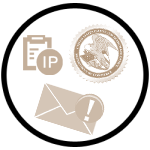The U.S. Patent and Trademark Office (USPTO) announced the release of the Patent Application Alert Service. This system provides customized, email alerts to the public for free when patent applications of interest are published. Additionally, the system offers direct access to the published applications that meet your search criteria.
Third-Party Preissuance Submissions
35 U.S.C. 122(e) provides a mechanism for third parties to submit patents, published patent applications, or other printed publications of potential relevance to the examination of a patent application with a concise description of the asserted relevance of each document submitted.

Under 35 U.S.C. 122(e), such submissions may be made before (1) the later of (i) 6 months after the date of publication or (ii) the date of a first Office action on the merits rejecting any claims, or (2) before the date of a notice of allowance, if earlier. Section 122(e) also provides for such fees as the Director may prescribe. This new provision was effective on September 16, 2012, and applies to any patent application.
After receipt of these customized, email alerts, the public may identify prior art for “pre-issuance” submission into these applications. The pre-issuance submission process was established under the America Invents Act (AIA), and to date, the agency has received more than 2,600 submissions across all technologies. More information on the pre-issuance submission program and how members of the public can participate can be found here.
User Note:

After having to make up my own Class III, super-secure, Defcon level Ernie password* just for a webpage to be able to receive an email that some publicly-available patent has published, alas I was unable to register for the Patent Application Alert Service in the end on an Apple (MacBook Air) computer using either Safari or Firefox browsers.
Send me a note if anyone is able to register under other means.
*Read here to understand why this is a stupid password policy.
Read full article HERE | SOURCE: Patent Baristas
